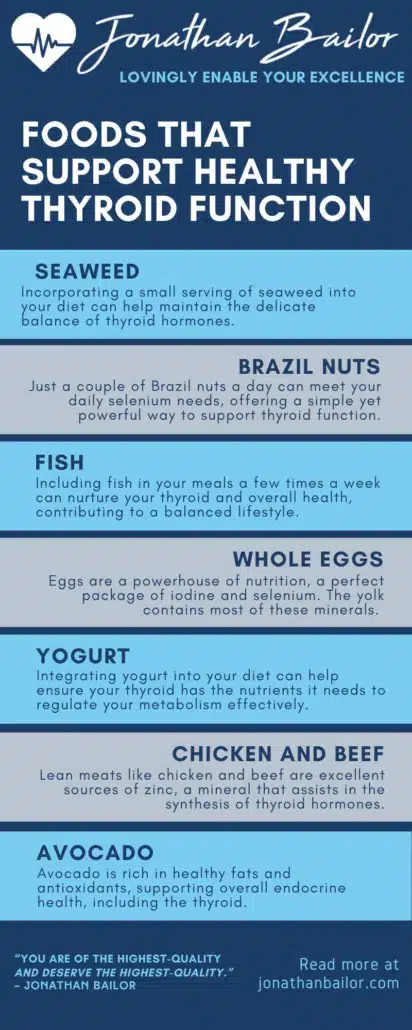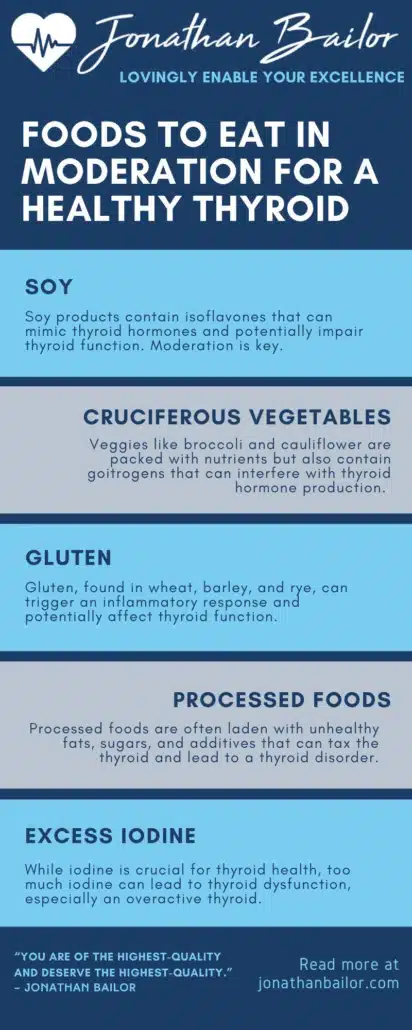7 Foods that Support Healthy Thyroid Function to Include in Your Diet
Dive into this Thyroid Health Guide with Jonathan Bailor and unlock the secrets to a balanced and thriving thyroid. This guide is your compass in the often complex quest for optimal thyroid function, where misinformation abounds, and clarity is sought.
Navigating the journey to maintaining a healthy thyroid isn’t always straightforward. With a myriad of advice out there, it’s easy to feel overwhelmed. Yet, the importance of thyroid health cannot be overstated—it’s the master control center for our metabolism, immune system, energy levels, and overall well-being. Think of it as the conductor of the orchestra, our body’s systems, ensuring every section plays in harmony.
For many, the solution doesn’t always have to come from a prescription bottle; often, it starts with what’s on our plate. The foods we choose to nourish our bodies can play a pivotal role in supporting thyroid health. It’s about adding more of the good stuff—foods rich in certain nutrients the thyroid thrives on—to our daily meals.
Imagine having a list of foods that are not only delicious but also act as allies for your thyroid. Foods that you can easily incorporate into your meals, bringing you one step closer to feeling energized and balanced. No need for a medical degree to understand their benefits or a chef’s skills to prepare them. These are everyday foods for everyday people, chosen for their thyroid-supporting superpowers.
This isn’t about restrictive dieting or taking away the joy of eating. It’s about empowering you with knowledge and choices—simple changes that can significantly impact you. So, whether you’re trying to support your thyroid health, prevent thyroid disease, boost your metabolism, or feel a bit more energized throughout the day, these foods are here to help you on that journey.
Before diving into the whirlwind of internet searches and health forums, take a breath. You’re about to discover seven foods that are not only accessible but are also backed by a simple philosophy: eating well to live well. You’ll want to share this approach to thyroid health, not just because it’s effective but because it’s a message of positivity and empowerment. A message that says, “Yes, you can take control of your health, and it can be delicious and fulfilling.”
Ready to transform your approach to health and vitality, one meal at a time? Let’s embark on this journey together, discovering the foods that could change how you think about thyroid health forever.
Nourishing Your Thyroid: 7 Key Foods to Keep Your Thyroid Healthy
In the quest for better health, understanding the symbiotic relationship between our diet and our thyroid function is paramount.
The thyroid, a small yet mighty gland in the neck, orchestrates the rhythm of our metabolism, energy levels, and overall vitality. It requires the right balance of nutrients to perform harmoniously.
Fortunately, the path to supporting this vital organ doesn’t require exotic superfoods or complex regimens. It starts with a simple, well-balanced diet of wholesome foods readily available in our kitchens or local grocery stores.
Introducing these seven foods into your daily meals can act as a foundation for thyroid health, offering a blend of essential nutrients that support its function. This list isn’t just about eating for health; it’s about making choices that empower you, bringing you closer to the vibrant energy and balance we all seek.
So, let’s explore these seven allies for your thyroid, each bringing its unique set of benefits to the table, making your journey towards better health enjoyable and nourishing.
1. Seaweed: The Ocean’s Gift to Thyroid Health
Seaweed stands out as a natural treasure trove of iodine, a mineral pivotal for thyroid hormone production. Unlike land vegetables, seaweed absorbs iodine from the sea, making it an unparalleled source. This food can help reverse an iodine deficiency.
Incorporating a small serving of seaweed into your diet can help maintain the delicate balance of thyroid hormones, ensuring your metabolism runs smoothly. From sushi wraps to soups and salads, seaweed is versatile, and a little goes a long way in supporting your thyroid health.
2. Brazil Nuts: Selenium’s Best Showcase
Brazil nuts are like nature’s thyroid support pills, brimming with selenium. This antioxidant-rich mineral is crucial in converting thyroid hormones to their active form, facilitating our body’s metabolism and energy use.
A few Brazil nuts a day can meet your daily selenium needs, offering a simple yet powerful way to support thyroid function.
3. Fish: Omega-3-Rich Waters
Fatty fish such as salmon, mackerel, and sardines are rich in Omega-3 fatty acids and selenium, both allies in thyroid health. Omega-3s help reduce inflammation, supporting thyroid function, while selenium aids in hormone synthesis.
Including fish in your meals a few times a week can nurture your thyroid and overall health, contributing to a balanced and energetic lifestyle.
4. Whole Eggs: The Complete Thyroid Supporter
Eggs are a powerhouse of nutrition, providing a perfect package of iodine and selenium. The yolk, in particular, contains most of these minerals, making eggs an ideal food for thyroid health.
Whether boiled, poached, or scrambled, eggs offer a versatile and effective way to support your thyroid every day.
5. Yogurt: Probiotic-Rich Thyroid Love
Low-fat or Greek yogurt is packed with iodine, one of the most crucial elements for thyroid health. Its probiotic content also supports gut health. After all, digestive health is closely linked to thyroid function.
Integrating yogurt into your diet can help ensure your thyroid has the nutrients it needs to regulate your metabolism effectively.
6. Chicken and Beef: Zinc’s Thyroid Boosting Heroes
Lean meats like chicken and beef are excellent sources of zinc, a mineral that assists in synthesizing thyroid hormones. Adequate zinc levels are essential for maintaining energy levels and a healthy metabolism.
Adding lean meat to your diet can bolster your thyroid function, providing a steady source of zinc.
7. Avocado: Healthy Fats for Hormone Balance
Avocado is rich in healthy fats and antioxidants, supporting overall endocrine health, including the thyroid. Its monounsaturated fats help maintain a healthy heart and metabolism, indirectly supporting thyroid function.
Incorporating avocados into your diet can be as simple as adding them to salads and smoothies or enjoying them as a nutritious snack.
Embracing these seven foods in your daily diet can be a delightful and nourishing way to support your thyroid health. Each food brings its unique blend of essential nutrients to the table, contributing to the harmony and balance of your thyroid function.
Remember, the journey to better health is paved with simple, mindful choices, and it all starts with what’s on your plate.

Feeling Better Is Priceless, That's Why We Don't Put A Price On It!
“It’s Like A Free and Medically Valid Version of Noom and Weight Watchers Online”
~ Dr. Doctor Matthew Oleshiak, MD
Click the 'LEARN MORE' button below for free lifetime access to the fast fix program developed by Jonathan and top Ivy League Medical Doctors
LEARN MOREP.S. It's not a free trial. It's not part of the program for free. The entire program is free, forever, for real! No credit card needed.
Foods to Approach with Caution for Thyroid Health
While nourishing the thyroid with beneficial foods is essential, it’s equally important to be mindful of what we might need to limit or avoid.
Despite its small size, the thyroid plays a gigantic role in our metabolism, energy, and overall health. However, while generally healthy, certain foods can interfere with thyroid function, especially in individuals with specific thyroid conditions. It’s about finding a balance and understanding how certain foods interact with our unique bodies.
This list of foods to approach cautiously is not about fear or complete avoidance. It’s about being informed and making choices that align with our health goals, especially when it comes to supporting our thyroid. With this knowledge, we can tailor our diets to suit our individual needs, ensuring our thyroid gets the support it requires.
Here are five foods that individuals with thyroid concerns might need to consume with consideration.
1. Soy: A Complex Contender
Soy products, celebrated for their versatility and health benefits, contain isoflavones that can mimic thyroid hormones and potentially impair thyroid function, leading to thyroid problems. This doesn’t mean soy is off-limits, but rather, moderation is key, especially for those with existing thyroid issues. Fermented soy products like tempeh or miso are generally considered better options, as fermentation reduces the goitrogenic activity.
Incorporating soy in small amounts, balanced with a diet rich in other thyroid-supportive foods, can mitigate potential risks.
2. Cruciferous Vegetables: A Delicate Balance
Vegetables like broccoli, cauliflower, and kale are packed with nutrients but also contain goitrogens, substances that can interfere with thyroid hormone production. Cooking these vegetables can help reduce their goitrogenic effect, making them safer for consumption.
They don’t need to be eliminated from the diet entirely; instead, cooking and consuming them in moderation can allow you to enjoy their health benefits without adversely affecting your thyroid.
3. Gluten: The Hidden Disruptor
For individuals with thyroid issues, especially an autoimmune disease like Hashimoto’s thyroiditis, gluten can exacerbate symptoms. Gluten in wheat, barley, and rye can trigger an inflammatory response and potentially affect thyroid function.
Opting for gluten-free grains and flours can help manage this risk, allowing the thyroid to function more effectively without the additional stress from gluten. Or, better yet, ditch grain foods and get your fiber from non-starchy vegetables!
4. Processed Foods: A Tangled Web of Additives
Processed foods are often laden with unhealthy fats, sugars, and additives that can tax the thyroid and lead to a thyroid disorder. They’re typically low in the nutrients the thyroid needs to thrive, such as selenium, zinc, and antioxidants.
By focusing on whole, unprocessed foods, you can provide your thyroid with the nourishment it needs while avoiding the empty calories and harmful ingredients found in many processed products.
5. Excess Iodine: Too Much of a Good Thing
While iodine is crucial for thyroid health, too much iodine can lead to thyroid dysfunction, especially an overactive thyroid (hyperthyroidism). Foods and supplements with high iodine content, such as iodized table salt, seaweed, and certain multivitamins, should be consumed judiciously. The key is balance, ensuring you get enough iodine for optimal thyroid function without overdoing it.
Monitoring your iodine intake, especially if you have an existing thyroid condition, can help maintain this balance.
In the journey towards supporting your thyroid, knowledge is your best ally. Understanding how these foods interact with your thyroid allows you to make informed decisions about your diet, tailoring it to support your health and well-being.
Remember, it’s not about eliminating foods but about creating a balanced, nutrient-rich diet that nurtures your thyroid and your body as a whole.

Thyroid Health FAQ
Navigating through the sea of information on thyroid health can sometimes feel like deciphering an intricate puzzle. With the thyroid playing such a crucial role in our body’s metabolism and energy regulation, it’s natural to have questions about how best to support its function.
Below are answers to some frequently asked questions about thyroid health, offering clarity and guidance on this vital topic.
1. What are the signs of an underactive thyroid (hypothyroidism)?
An underactive thyroid, or hypothyroidism, can manifest through various symptoms, reflecting its wide-reaching impact on the body’s functions. Common signs include unexplained fatigue, weight gain despite no change in diet or exercise habits, sensitivity to cold, dry skin, hair thinning, and changes in mood, such as feeling unusually depressed or forgetful.
Since these symptoms can be quite general and overlap with other conditions, it’s important to consult a healthcare provider for an accurate diagnosis and treatment.
2. Can diet alone manage thyroid conditions?
Diet plays a significant role in supporting thyroid health, but it’s usually part of a broader management plan, especially for those with diagnosed thyroid disorders. Nutrient-rich foods can support thyroid function and overall well-being, but they might not be enough to manage a thyroid condition on their own.
Thyroid hormone medication, such as hormone replacement therapy for primary hypothyroidism, is often necessary and should be guided by a healthcare professional. More than one thyroid medication may also be required to manage specific thyroid diseases. Always see your healthcare provider about any health concerns. A balanced approach combining diet, lifestyle changes, and medical treatment offers the best pathway to managing thyroid health.
3. Are there natural supplements that support thyroid health?
Several natural dietary supplements are thought to support thyroid health, including selenium supplements, zinc, and vitamin D. These nutrients play roles in thyroid hormone production and regulation. However, it’s crucial to approach supplementation cautiously, as excessive intake can lead to adverse effects.
Always consult a healthcare provider before starting any new supplement, especially if you have a thyroid condition, to ensure it’s safe and appropriate for your specific health needs.
4. How does exercise impact thyroid health?
Regular, moderate exercise can positively impact thyroid health by helping regulate thyroid hormone levels, reduce stress, and improve overall well-being. However, it’s important to note that excessive or intense exercise may have the opposite effect, potentially straining the thyroid gland.
Finding a balanced exercise routine that includes activities like walking, yoga, and strength training can support thyroid health without overexertion.
5. Is it necessary to avoid goitrogenic foods to maintain thyroid health?
Goitrogenic foods, such as cruciferous vegetables and soy products, can interfere with thyroid hormone production in large quantities. However, for most people, these foods can be part of a healthy diet when consumed in moderation and, ideally, cooked, which reduces their goitrogenic effect.
If you have a thyroid condition, particularly one that’s iodine-sensitive, it’s wise to discuss your diet with a healthcare provider to determine the best approach for you.
Understanding thyroid health can empower you to make informed decisions about your diet, lifestyle, and treatment options. Remember, each person’s journey with thyroid health is unique, so it’s important to work closely with healthcare professionals to tailor a plan that meets your needs.

Embrace and Share the Journey to Thyroid Wellness
As we wrap up our exploration of supporting thyroid health through mindful eating and lifestyle choices, remember that the journey to wellness is not one we walk alone. The insights and foods discussed offer a pathway to not just better thyroid health but to a fuller, more vibrant life. Sharing this knowledge with friends and family can spark conversations, inspire changes, and even offer support to someone unknowingly searching for answers.
So, let’s take this journey together. Share this guide across all social media platforms and email. Together, we can spread the word about nurturing our thyroid, the guardian of our metabolism and energy, and foster a community of health and awareness.
Feeling Better Is Priceless, That's Why We Don't Put A Price On It!
“It’s Like A Free and Medically Valid Version of Noom and Weight Watchers Online”
~ Dr. Doctor Matthew Oleshiak, MD
Click the 'LEARN MORE' button below for free lifetime access to the fast fix program developed by Jonathan and top Ivy League Medical Doctors
LEARN MOREP.S. It's not a free trial. It's not part of the program for free. The entire program is free, forever, for real! No credit card needed.




